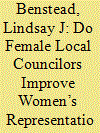|
|
|
Sort Order |
|
|
|
Items / Page
|
|
|
|
|
|
|
| Srl | Item |
| 1 |
ID:
168847


|
|
|
|
|
| Summary/Abstract |
Tunisia’s 2018 municipal elections, in which a legislated quota was implemented and women won 47 percent of seats, raises questions about whether electing female councilors improves women’s representation in clientelistic settings. Using data from the Local Governance Performance Index (LGPI), an original survey of 3,600 Tunisians conducted in 2015 by the Program on Governance and Local Development (GLD), this article investigates the relationship between local councilors’ gender and women’s access to help with personal or community issues. Three findings emerge. First, male citizens are thirteen percentage points more likely than female citizens to know a local councilor and six percentage points more likely to have contacted a councilor for help. This offers evidence of greater network homosociality for club goods than personal requests. Second, citizens of both genders are twice as likely to contact a councilor of the same gender when asking for help with community problems. Finally, electing females increases women’s access to councilors, due to network homosociality—that is, denser personal networks with others of the same gender—but has a limited impact on men’s access because female councilors have more heterosocial networks. By showing that electing and appointing women improves service and allocation responsiveness to females, the results call attention to the need to address gender equity issues when drafting electoral laws and implementing decentralization laws.
|
|
|
|
|
|
|
|
|
|
|
|
|
|
|
|
| 2 |
ID:
184085


|
|
|
|
|
| Summary/Abstract |
How should we understand the formation of the grid management system (网格化管理) of grass-roots governance in China? In this article, I argue that the grid system is an extension of existing governance structures. Facing conflicting central messaging, local grid development encountered isomorphic pressures, leading grids to resemble higher-level administration and to inherit a top–down and stability-focused mode of operation. To support this argument, I analyse five aspects: shifts in elite-level discourse, the proliferation of the grid system, recruitment standards for grid members, grid members’ tasks, and their assessment. Showcasing wide local variety, the grid system retains a managerial approach while collapsing service provision into security.
|
|
|
|
|
|
|
|
|
|
|
|
|
|
|
|
| 3 |
ID:
188689


|
|
|
|
|
| Summary/Abstract |
The share of basic services that NGOs deliver has grown dramatically in developing countries due to increased receipt of aid and philanthropy in these countries. Many scholars and practitioners worry that NGOs reduce reliance on government services and, in turn, lower demand for government provision and undermine political engagement. Others argue that NGOs prop-up poorly performing governments that receive undeserved credit for the production, allocation, or welfare effects of NGO services. Using original surveys and a randomized health intervention, implemented in parallel to a similar universal government program, this article investigates the long-term effect of NGO provision on political attitudes and behavior. Access to NGO services increased preferences for NGO, relative to government, provision. However, political engagement and perceptions of government legitimacy were unaffected. Instead, the intervention generated political credit for the incumbent president. This study finds that citizens see NGOs as a resource that powerful government actors control, and they reward actors who they see as responsible for allocation of those resources.
|
|
|
|
|
|
|
|
|
|
|
|
|
|
|
|
| 4 |
ID:
165948


|
|
|
|
|
| Summary/Abstract |
This article explores who among the citizens in the former Federally Administrated Tribal Areas (FATA) of Pakistan is in favor of democratic reforms. Empirical analyses reveal that the government’s wartime service provision politicized citizens and framed their attitude toward the issues of FATA’s jurisdiction and the Frontier Crimes Regulation.
|
|
|
|
|
|
|
|
|
|
|
|
|
|
|
|
|
|
|
|
|